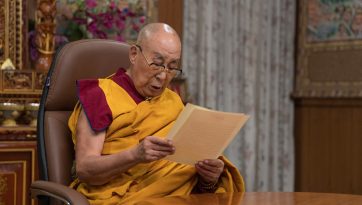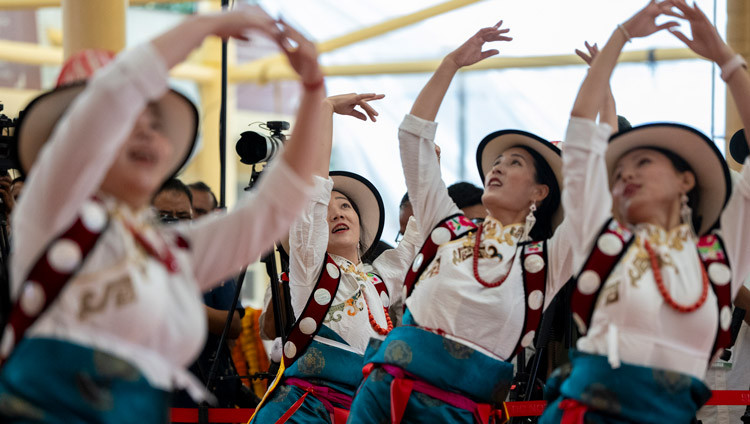Our World in a Time of Change
March 29, 2021
Thekchen Chöling, Dharamsala, HP, India – His Holiness the Dalai Lama arrived smiling broadly this morning. He scanned the faces of students in Russia, laughed, waved and sat down.
Prof Nikolai Yankovski, Member of the Russian Academy of Sciences, introduced himself and explained that he would be moderating today’s conversation instead of Prof Tatiana Chernigovskaya, Director of Institute for Cognitive Research, St. Petersburg State University, who had lost her voice. He clarified that the main participants in today’s meeting were students at Russian universities. He hoped the experience would be as significant for them as meeting His Holiness had been for him.
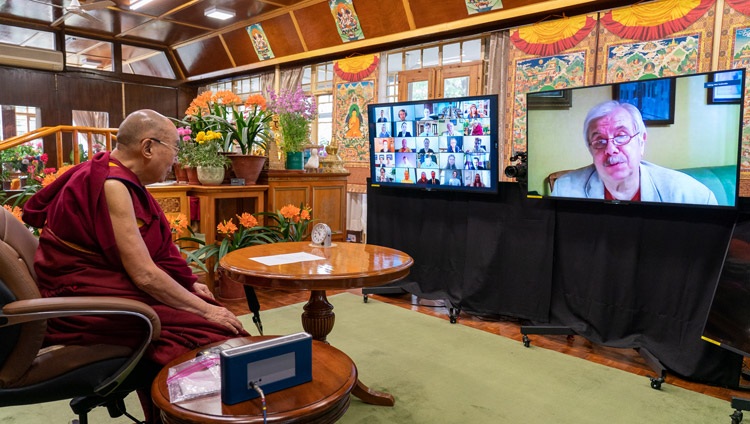
His Holiness opened his talk with the observation that we are all the same as human beings.
“We all want to live a happy life. We don’t want suffering. Like other animals, even those as small as insects, we want to lead an undisturbed happy life. What makes a difference is that human beings are intelligent and we try to use our intelligence to find happiness. But sometimes we are short-sighted and narrow-minded about it. In the past, for example, we Tibetans would pray for the welfare of all sentient beings, but in fact we were really only concerned with Tibetans. I expect it was the same for you Russians too.
‘The twentieth century saw two world wars. We used our human intelligence and scientific knowledge for military purposes. We developed ever more destructive weapons including nuclear bombs and missiles armed with nuclear warheads. We only thought of ourselves. Now, we have to think of the whole of humanity, not just this or that nation. Since we all have to live together on this one planet, there’s no room for fighting on the basis of a division into ‘us’ and ‘them’—that’s an old way of thinking.
“When it comes to building a happier world, we have to see cultural and linguistic differences between us as secondary. We need to take the whole of humanity into account. Previously, because we only thought in narrow terms, we stumbled into war with all the misery it entailed.
“Russia is a great nation with great potential to contribute to a happier world. I’m happy to have this opportunity today to talk to you students and to take your questions.”
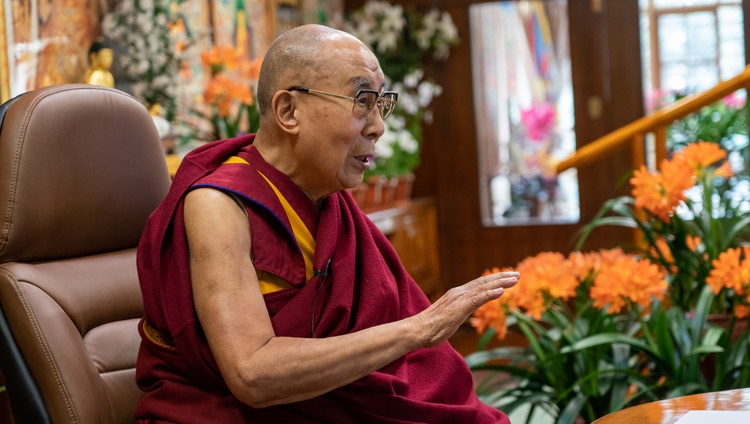
A student at Kalmyk State University explained that he and his friends had volunteered to help those in need during the pandemic. He asked if they should risk their lives out of compassion. His Holiness replied that if you truly practise compassion, you are primarily concerned with others rather than yourself.
“I greatly admire those who have helped people who were sick or alone, despite the risk to themselves. Active concern for others, even sacrificing your own life, is an expression of real compassion. Those of us who follow Indian spiritual traditions, such as Buddhism, believe that we live life after life. If you give up your life for the sake of someone else, you can be confident of a good life in the future. This echoes the Christian, Muslim and Jewish belief that if you sacrifice yourself for others, God will take care of you.”
His Holiness told a student from Buryat State University that faith should be combined with wisdom. This means examining the teaching in the light of reason. It is said that people with limited education rely on blind faith. Those more able to exercise their intelligence rely on reason.
Asked by a student from St Petersburg State University whether there is anything that is beautiful for everyone, His Holiness responded,
“Warm-heartedness. Even animals appreciate it. If you are motivated by loving kindness, it will be reflected in the happy expression on your face. Real beauty is inner beauty.”
A student from the Tuvan State University wanted to know if there is any conflict between pursuing technological development and spirituality.
“Technology is created and used by human beings,” His Holiness pointed out. “If it is employed judiciously with a sense of altruism, the result will be good. A computer has no emotional response of its own. The effect it may have in any given situation very much depends on the person who uses it. If the person who uses it today is generous and kind, the effect is likely to be positive. But if the same piece of equipment is used tomorrow by someone who is angry and spiteful, the result is more likely to be detrimental.
“We human beings are compassionate by nature. From birth we are sheltered by our mother’s love. We depend on others for our very survival. Scientists observe that because we are social animals, we are naturally concerned about our own community and yet modern education concentrates on external things. If we were to cultivate a sense of emotional hygiene, the way we observe physical hygiene to preserve our health, we’d learn to tackle our destructive emotions and nurture a sense of altruism.”
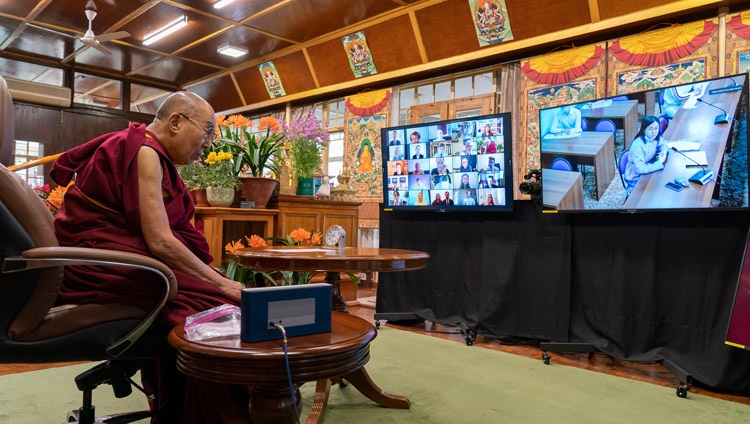
A young woman from Moscow State University wondered how humanity would be if everyone became enlightened. His Holiness clarified that Buddhahood is a state in which the mind has been completely purified of negative emotions. The nature of the mind is clear light and compassion, whereas destructive emotions are rooted in ignorance. However, it is because negative emotions have no sound basis that they can be eliminated and the clear light nature of the mind can be revealed.
His Holiness stated that this was the practice of great masters of the past and is a practice he himself has followed. It’s because the nature of the mind is clear light that we can reduce and eliminate ignorance. This makes us masters of our own destiny.
Another Buryat student enquired why more women than men seemed to be interested in the spiritual life. His Holiness conceded that he’s noticed that in the West, for example, there are more Christian nuns than monks. He speculated that women may be more aware of how dependent we all are on each other. He declared that the Buddha had given the same opportunities to men and to women inasmuch as both could receive monastic ordination.
A young woman from Moscow was interested to know how Buddhism had been affected by greater interaction with other cultures and systems of knowledge in recent times. His Holiness told her that at the time of the Buddha, followers of what later became the Pali Tradition did not scrutinize what he had taught. Later, the masters of the Nalanda Tradition employed reason extensively. Those like Nagarjuna and Chandrakirti had very sharp, independent minds. Chandrakirti taught that nothing exists by itself; things only exist by way of designation, which is a very subtle interpretation of the Middle Way. Other great scholars were unable to accept this because of fear of the notion that nothing exists the way it appears.
His Holiness emphasized that because wisdom is the antidote to ignorance, investigating different ways of thinking in the light of reason is immensely important. This approach, typical of the Nalanda Tradition, is what has enabled His Holiness and thousands of scholars from the monastic centres of learning in South India to engage fruitfully with modern scientists.
After a year in which students have related to their teachers and studied online and His Holiness himself has taught regularly online, he told a young Kalmyk woman that when it is possible, direct personal communication has its own benefits. However, no Buddhist alive today has met the Buddha. What he taught has been preserved in Tibetan in the 100 volumes that record his words, the 220 volumes of subsequent Indian treatises and the 10,000 works by Tibetan scholars and the minds of those who read them. It’s a living tradition.
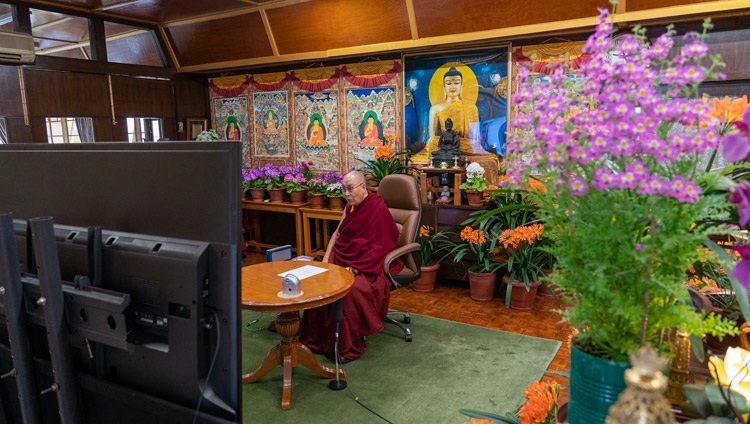
His Holiness assured a St Petersburg student that from a Buddhist point of view everything depends on us. This galaxy arises because of our karma. If we train our minds, cultivating altruism and wisdom we can put an end to the cycle of existence. Mind has no beginning or end. So long as it is shrouded in ignorance, we remain sentient beings. But once ignorance has been eliminated our mind becomes the mind of a Buddha.
However, His Holiness rejects giving in to difficulties that may arise because they are ‘the result of our karma’. He stressed that there are few situations that cannot be changed and that negative karma can be countered by creating positive karma. His Holiness explained that faced with circumstances beyond our control it’s good to be patient, but it is not appropriate to be patient with the suffering in general. Since we each have Buddha nature, it’s much better to try to fulfil it by overcoming ignorance and suffering.
With regard to relations between science and Buddhism, His Holiness remarked that when he was in Tibet, he had virtually no contact with scientists, although as a child he was naturally curious. In India and elsewhere he has been able to meet with scientists and engage in discussions with them. Subsequently, the study of science has been included in the curriculum of the monastic centres of learning. Monks and nuns have learned about the physical world. Scientists have learned about the workings of the mind and emotions, as well as ways to cultivate and preserve peace of mind. His Holiness outlined the varying subtlety of different states of mind.
As to how to maintain peace mind when there is so much trouble in the world, His Holiness cited the example of problems that arise because of global heating. Many of them, such as hurricanes and wild-fires, are beyond our control. However, by cutting our use of fossil fuels and turning instead to renewable sources of energy, such us solar and wind power, we can curtail the carbon emissions that are at the root of the problem.
The moderator, Prof Nikolai Yankovski thanked His Holiness for his helpful answers. He told him it had been a great pleasure to be in touch with him.
In his final advice, His Holiness noted that some Russian republics have traditionally been Buddhist. “People who haven’t had the opportunity to study, who only engage in saying prayers and performing rituals shouldn’t be content with that. Study as much as you can. Compare what you learn with science. Bring the Nalanda Tradition alive. Thank you and see you again.”

